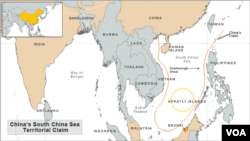The United States will monitor the South China Sea to see whether "de-escalatory steps'' are being taken, a U.S. State Department official said on Monday, a day after China repelled U.S. pressure to rein in actions in the disputed waters.
The official spoke as Secretary of State John Kerry arrived in Sydney for a meeting with Defense Secretary Chuck Hagel and Australian officials to discuss increased defense and cyber security cooperation.
A U.S. proposal for a freeze on provocative acts in the South China Sea got a cool response from China and some Southeast Asian nations at a regional meeting at the weekend, an apparent setback to U.S. efforts to thwart China's assertive moves.
"The immediate follow-up ... is to assess the meeting scheduled in a few weeks between ASEAN and China at the working group and the senior official level to discuss what equates to the freeze,'' the U.S. official told reporters.
"We will also be monitoring the actual situation around the rocks, reefs, and shoals in the South China Sea.''
China's Xinhua state news agency warned on Monday that "by stoking the flames, Washington is further emboldening countries like the Philippines and Vietnam to take a hardline stance against China, raising suspicion over the real intention of the United States and make an amicable solution more difficult to reach.''
"It is a painful reality that Uncle Sam has left too many places in chaos after it stepped in, as what people are witnessing now in Iraq, Syria and Libya,'' Xinhua added in a commentary. ``The South China Sea should not be the next one.''
Tension spiked in May when China parked a giant oil rig in waters claimed by Vietnam. The U.S. and Philippine proposals aimed to prevent such action, as well as building and land reclamation work on disputed islands being carried out by China and other claimants.
The rancor over the disputed sea has split ASEAN, with several states including some of the claimant nations reluctant to jeopardize rising trade and investment ties with China.
China has been able to use its influence to block regional action on the maritime issue before, most notably in 2012 when an ASEAN meeting chaired by Chinese ally Cambodia broke down in acrimony.
"I think it's pretty clear, China's actions speak for themselves,'' U.S. Defense Secretary Chuck Hagel told reporters at a briefing in Sydney, adding the U.S. position remained that such disputes should be resolved through international law.
'Pacific power'
Australia was one of the countries to support the U.S. proposal at the weekend ASEAN meeting in Myanmar.
Australian Foreign Minister Julie Bishop traveled to Australia with Kerry and they planned to explore follow up actions to the Myanmar talks including an upcoming meeting between ASEAN members and China, the official said.
Bishop is hosting the annual Australia-United States Ministerial Consultations (AUSMIN) in Sydney, where defense and security cooperation is expected to be high on the agenda along with Iraq and Ukraine.
Talks will include discussions on cooperation in ballistic missile defense, cyber security and maritime security, Hagel told reporters at a briefing with Australian Defense Minister David Johnston ahead of the formal talks.
The ministers will sign an agreement reached between President Barack Obama and Australian Prime Minister Tony Abbott on the deployment of U.S. marines to Australia for joint exercises and training in areas such as disaster relief.
"It will expand our regional cooperation here in Asia-Pacific from engagement with ASEAN to the trilateral cooperation that we have been working on with Japan,'' Hagel said, adding that the U.S. was firmly committed to its rebalance to the region.
"We have an interest here, we will continue to have an interest here, we are a Pacific power.''
Some 1,150 Marines are stationed in Darwin in Australia's tropical north under a 2011 agreement that launched President Barack Obama's strategic "pivot'' to the fast-growing Asia region. The Marine contingent, primed to respond to regional conflicts and humanitarian crises, is expected to swell to 2,500 by 2017.
Obama's pivot has irked China, which sees it as an attempt to block its growing diplomatic, military and political influence across the region, and has faced criticism from some allies doubtful about U.S. commitment to the strategy.
Johnston said the further deployment of U.S. troops in Australia would be one of the issues on the agenda at Tuesday's talks, amid reports that the U.S. plans to station more fighter jets and bombers in Australia's north.









